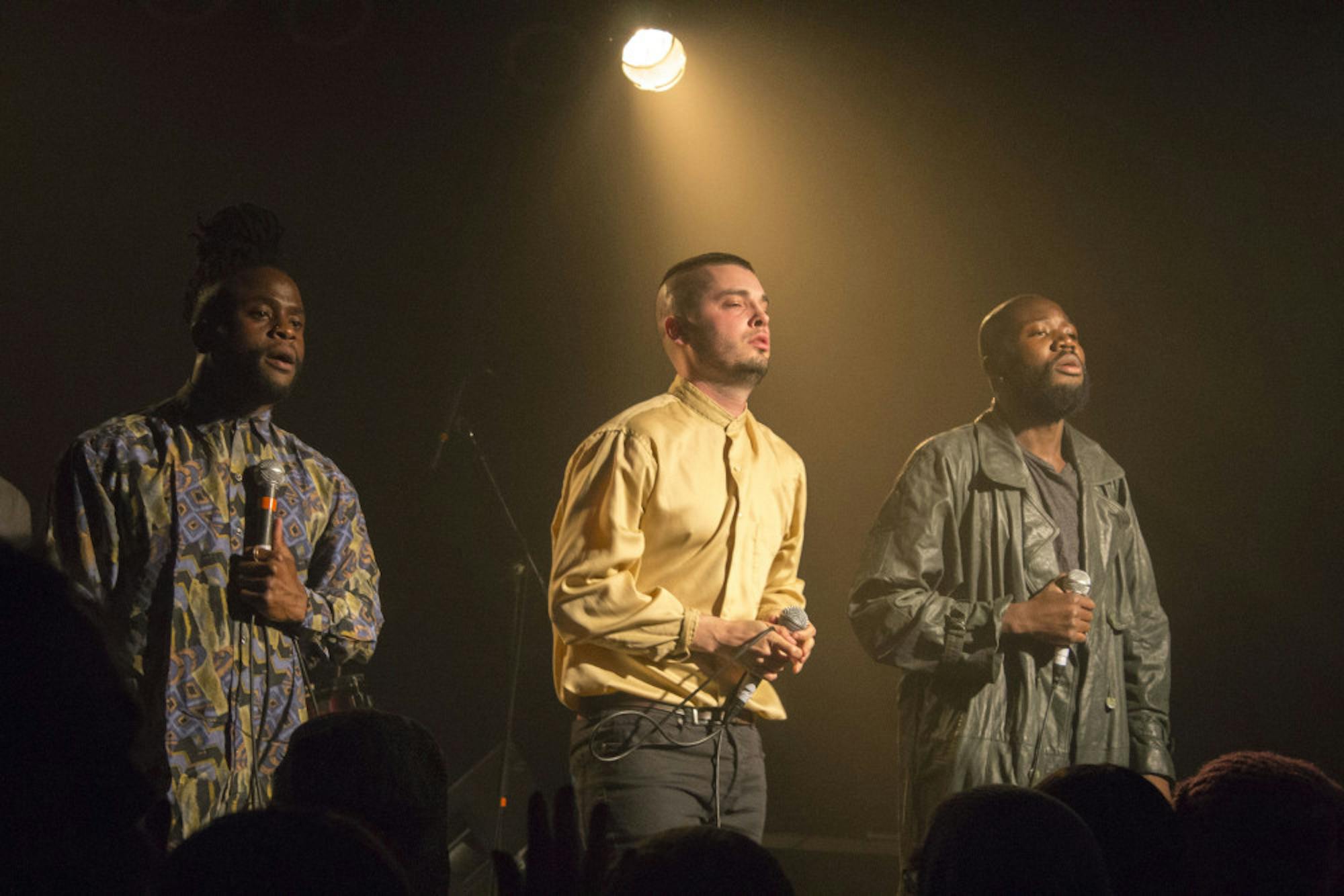The band Young Fathers challenges the restraints of genre definition. On its latest album, “White Men Are Black Men Too,” released April 6, the Edinburgh-based trio switches from blues to funk to soul to R&B to hip-hop to trip-hop to rap to rock so quickly that the multidimensionality should be dizzying. The combination is, in fact, intoxicating. To categorize Young Fathers into one musical genre is to not give their work the full sweeping arc of praise that it merits. To allocate their lyrics into the specifications of either realms of political or personal, is to deny their full scope. The lyrics take personal tales and magnify them, at times making uncomfortably personal tales into digestible, danceable tracks. The combination should not be a shock. The band’s label, Big Dada recordings, reps artists known for their propensities to blur the lines between danceability and narrative, most notably Run the Jewels. But while RTJ’s stunning self-titled LP "Run the Jewels 2," released October 2014 last year, addressed race with an unyielding hard-hitting powerhouse collection of tracks, Young Fathers takes a subtler swipe at handling the conversation. Lyrics are hidden under trumpet solos, hiding in plain sight on songs that rattle on with a danceable pop undercurrent of potential Top 40 popularity.
The album evokes clear parallels to the fictional Irish blues band The Commitments, the band from the 1991 film of the same name. In fact, the film’s famous line, “I’m Black and I’m proud,” seems to ebb out from every track, whether or not the lyrics explicitly state it. The album name in and of itself is a provocation, a declaration of identity and responsibility, a question and an answer at once.
“Still Running” jolts the album to a start. With a whisper of “Here’s another ticket,” the trio promises that the album is going to be a wild ride, kick-started with an electricity and an addictive balance of joy and fury that propels many of the songs. There is a strong balance, a push-pull force between self-love and vainglory as MC Alloysious Massaquoi sings, “Tonight I don't love God / My time to enjoy life / My time to ignore life.”
“Shame” combines hip-hop, soul and R&B, bringing in electric guitars, moments of laser sound effects and the exquisite vocals from MC Alloysious Massaquoi, Kayus Bankole and Graham “G” Hastings. “Feasting” begins with a creeping beat, and with a bass line sneaking in and a gospel chorus rounding out the sound, the track sounds both ghostly and visceral. The two tracks have vastly different sounds as trip-hop and R&B meet, but the rendezvous is more of a tango than a collision, a surprising hit.
“27” combines a rhythm that draws on African and Caribbean musical motifs with reggae-tinged back-up vocals and a sunny-pop vibe. Then, the lyrics knock the wind out of listeners. The breeziness of the instrumentation is not enough to strip away the force of lines like “Easier to breathe / It all seems wrong when you're picking out your coffin / I’m 27 and not in heaven / I killed a man with my bare hands, please forgive me / Lack of passion / Leave the dumb boy alone / I know your God is here right now / At least not for long.” The contrast elevates the lyrics so they hit a gut-deep level of narration.
There are standout notes that could be discordant, were they not interwoven beautifully. The electric keyboard that begins “Rain or Shine,” echoes the pacing of the instrumentation on “27” which precedes it. The song stops abruptly at the end, transitioning the album into the following track, “Sirens,” which begins at a dead stop.
Likely the album’s best track, “Old Rock N Roll” plunges into the conversation about race relations headfirst. Between funky bass lines and a steady syncopation, the group sings, “I said I’m tired of playing the good Black / I’m tired of having to hold back / I’m tired of wearing this hallmark for some evils that happened way back / I’m tired of blaming the white man.” There is a rejoice on the track that breathes life into it, gospel and chiming bells playing at hyperspeed give the track a frenetic, zealous tone.
The subsequent track, “Nest,” slinks through R&B rhythms with the crooning voice of Massaquoi to guide it. A piano brings in a major tonality to the piece, while the backup voices of singers breathing a “hey hey hey” make the track a powerful and infectious pop R&B love ballad. The next track, “John Doe,” combines electro lo-fi influences with trip-hop and stronger rock influences.
“Dare Me” whisper-sings, returning to the murmuring of the first track and creating a beautiful dialogue within the album itself. Then a nasty beat drops and a grinding hip-hop beat and a harshness ooze in. The lyrics don’t let anything settle: “He cleans his crystals / While I reload my pistols / You filthy boy / You never had a chance.”
The album comes full circle with “Get Started,” an R&B number that sparkles with synth and a steady kick drum backing. Both amping up and slowing down, the track keeps the conversation going. Full-bodied, experimental and unflinchingly provocative and proud, “White Men Are Black Men Too” is a beautiful dynamic narrative of life, blurring lines between race relations as quickly and effortlessly as it blends genres.






